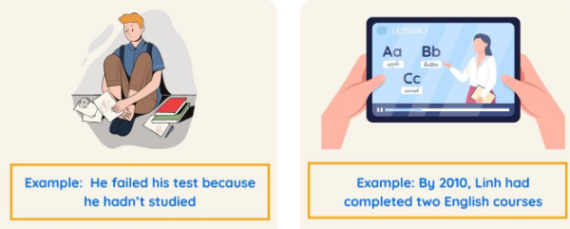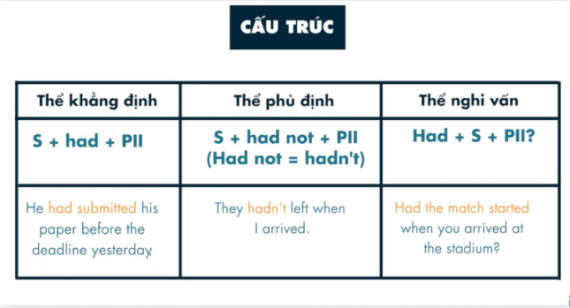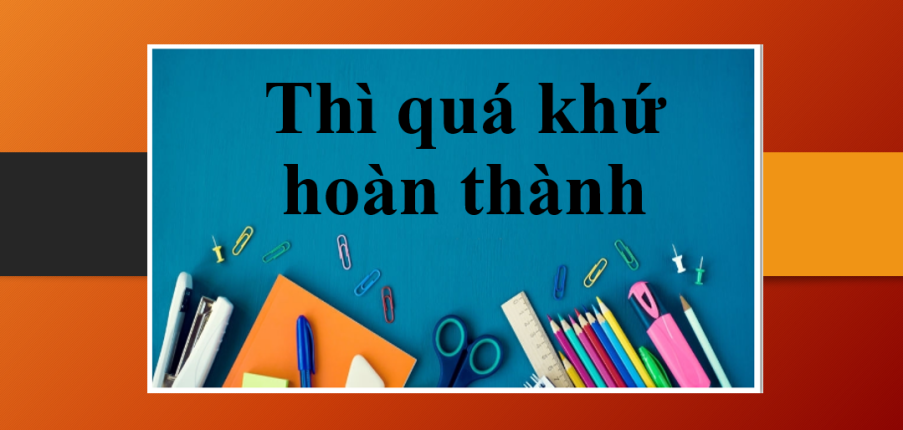Past perfect tense (Thì quá khứ hoàn thành) | Định nghĩa, công thức, cách dùng, dấu hiệu nhận biết và bài tập vận dụng
Định nghĩa thì quá khứ hoàn thành
Thì quá khứ hoàn thành (past perfect tense) dùng để diễn tả một hành động xảy ra trước một hành động khác trong quá khứ.
- Hành động nào xảy ra trước ⇒ quá khứ hoàn thành
- Hành động xảy ra sau ⇒ quá khứ đơn
Một số ví dụ về quá khứ hoàn thành trong tiếng Anh:

Công thức quá khứ hoàn thành
Cũng giống như 12 thì khác trong tiếng anh, Công thức thì quá khứ hoàn thành được chia làm 3 dạng (khẳng định, phủ định, nghi vấn) cụ thể như sau:
| |
Khẳng định |
Phủ định |
Nghi Vấn |
| Công Thức |
S + Had + Phân từ 2 |
S + had not + Phân từ 2 (had not = hadn’t) |
Had + S + Phân từ 2
|
| Ví Dụ |
He had submitted his paper before the deadline yesterday |
They hadn’t left when i arrived |
Had the match started when you arrived at the stadium ? |
Tips: Để đơn giản hóa, các bạn chỉ cần nhớ chia từ have/has trong Hiện tại hoàn thành về quá khứ “had”.
- Hiện tại hoàn thành: S + have/has + PII
- Quá khứ tiếp diễn: S + had + PII

Cách dùng thì quá khứ hoàn thành
1. Diễn tả một hoạt động đã xảy ra và hoàn thành trước một hành động khác trong quá khứ
Ví dụ:
- Jane had cooked breakfast when we got up. (Jane đã nấu bữa sáng trước khi chúng tôi thức dậy.)
- The plane had left by the time I arrived at the airpot.(Máy bay đã rời đi trước khi tôi tới sân bay.)
2. Diễn tả một hành động đã xảy ra và kéo dài tới một thời điểm nhất định trong quá khứ
Ví dụ:
- We had had that car for ten years before it broke down. (Chúng tôi đã có cái ô tô đó trong mười năm trước khi nó bị hỏng.)
- By the time Alex finished his studies, he had been in London for over eight years. (Trước khi Alex hoàn thành việc học, anh ấy đã ở London được tám năm.)
3. Diễn tả một hành động xảy ra trước một thời điểm nhất định trong quá khứ
Ví dụ:
- She had travelled around the world before 2010. (Cô ấy đã đi vòng quanh thế giới trước năm 2010.)
- He had never played football until last week. (Anh ấy chưa từng bao giờ chơi bóng đá cho tới tuần trước.)
4. Diễn tả hành động xảy ra như là điều kiện đầu tiên cho hành động khác
Ví dụ:
- Tom had prepared for the exams and was ready to do well. (Tom đã chuẩn bị cho bài kiểm tra và sẵn sàng để làm tốt)
- Dunny had lost twenty pounds and could begin anew. (Dunny đã giảm 20 pounds và có một ngoại hình mới).
5. Sử dụng trong câu điều kiện loại 3 để diễn tả điều kiện không có thực trong quá khứ
Ví dụ:
- If I had known that, I would have acted differently. (Nếu tôi biết điều đó, tôi đã hành xử khác đi.)
- She would have come to the party if she had been invited. (Cô ấy lẽ ra đã đến bữa tiệc nếu cô ấy được mời.)
6. Dùng để thể hiện sự thất vọng về sự việc nào đó trong quá khứ
Các dùng này thường thấy trong cấu trúc điều ước ở quá khứ.
Ví dụ:
- We wished we had purchased the ticket. (Chúng tôi ước là mình đã mua tấm vé.)
- I wished I had told the truth. (Tôi ước là tôi đã nói sự thật.)
Dấu hiệu nhận biết thời quá khứ hoàn thành
Quá khứ hoàn thành thường được dùng kèm với các giới từ và liên từ như:
- Until then, prior to that time, as soon as, by, …
- Before, after, when, by the time + S + V; by the end of + time in the past …
Ví dụ:
- When I got up this morning, my father had already left. (Khi tôi thức dậy sáng nay, cha tôi đã dời đi.)
- By the time I met you, I had worked in that company for five years. (Vào thời điểm tôi gặp bạn, tôi đã làm việc trong công ty đó được năm năm.)
Cách phân biệt quá khứ đơn và quá khứ hoàn thành
Thì Quá khứ đơn mô tả một hành động xảy ra trong quá khứ và đã chấm dứt hẳn còn thì Quá khứ hoàn thành lại có ý nghĩa nhấn mạnh vào hành động đó xảy ra trước một mốc thời gian cụ thể hoặc một hành động khác đã chấm dứt trong quá khứ.
Ví dụ: I had moved to Da Nang to live before my little sister got married.
Bài tập vận dụng Thì quá khứ hoàn thành
Bài 1. Chia động từ cho sẵn theo dạng đúng thì quá khứ hoàn thành
1. When David came, everybody ________ (leave).
2. He ________ (already/watch) the movie, so he wouldn’t want to see it atopgain.
3. My kids didn’t eat anything at the party because they _________ (eat) dinner at home.
4. The motorbike burned just after it ______ (crash) into the tree.
5. John _______ (not/complete) his homework by the deadline, so he called his teacher to tell that he would submit it late.
6. She didn’t cry because she _______ (know) the truth.
Đáp án
| 1. had left |
2. had already watched |
3. had eaten |
| 4. had crashed |
5. hadn’t completed |
6. had known |
Bài 2. Chia động từ đã gợi ý theo dạng đúng thì quá khứ hoàn thành
1. The tornado destroyed the tent that we (build) ____________.
2. She (not / be) ____________ to Hanoi before 2018.
3. When he went out to play, he (do / already) ____________ his homework.
4. My sister ate all of the cake that our mum (make) ____________ .
5. The nurse took off the plaster that she (put on) ____________ six weeks before.
6. The waitress brought a drink that I (not / order) ____________ .
7. I could not remember the song we (learn) ____________ three week before.
8. The children collected mangos that (fall) ____________ from the tree.
9. (she / phone) ____________ Nam before she went to see him in Laos?
10. He (not / ride) ____________ a elephants before that day.
Đáp án
1. had built
2. had not been
3. had already done
4. had made
5. had put on
6. had not ordered
7. had learned
8. had fallen
9. had she phoned
10. had not ridden
Bài 3. Viết lại câu dựa vào những từ cho sẵn, kết hợp thì quá khứ đơn và quá khứ hoàn thành
1. David had gone home before we arrived.
After…………………………………………………………………………………….
2. We had lunch then we took a look around the shops.
Before……………………………………………………………………………………
3. The light had gone out before we got out of the office.
When…………………………………………………………………………………….
4. After she had explained everything clearly, we started our work.
By the time…………………………………………………………………………….
5. My father had watered all the plants in the garden by the time my mother came home.
Before………………………………………………………………………………….
Đáp án
1. After David had gone home, we arrived.
2. Before we took a look around the shops, we had had lunch.
3. When we got out of the office, the light had gone out.
4. By the time we started our work, she had explained everything clearly.
5. Before my mother came home, my father had watered all the plants in the garden.
Bài 4. Hoàn thành các câu sau sử dụng từ cho trước
1. You went to Suc’s house, but she wasn’t there. (she/ go/ out)
2. You went back to your home town after many years. It wasn’t the same asbefore. (it/ change/ a lot)
3. I invited Rachel to the party, but she couldn’t come. (she/ arrange/ to do something else)
4. You went to the cinema last night. You got to the cinema late. (the film/ already/ begin)
5. It was nice to see Dan again after such a long time. (I/ not/ see/ him for five years)
6. I offered Sue something to eat, but she wasn’t hungry. (she/ just/ have breakfast)
Đáp án
1. She had gone out.
2. It had changed a lot.
3. She’d arranged to do something else.
4. The film had already begun.
5. I hadn’t seen him for five years.
6. She’just had breakfast.
Bài 5. Chia các động từ trong ngoặc
1. Kevin _________ (go) home by the time I arrived.
2. Ethan suddenly realized that he _________ (leave) his laptop on the train.
3. Mum was annoyed because I _________ (not clean) my room.
4. _________ (they / study) English before they went to the USA?
5. We were hungry because we _________ (not eat).
6. My phone didn’t work because I _________ (not charge) it.
7. Why didn’t you want to watch the film? _________ (you / see) it before?
8. Sally was embarrassed because she _________ (forget) her dad’s birthday.
Đáp án
1. had gone
2. had left
3. hadn’t cleaned
4. Had they studied
5. hadn’t eaten
6. hadn’t charged
7. Had you seen
8. had forgotten / forgot
Bài 6. Viết lại câu sử dụng từ trong ngoặc, thay đổi động từ sang thì quá khứ hoàn thành và thực hiện bất kỳ thay đổi nào khác nếu cần thiết để câu có nghĩa.
Ví dụ: Tina left her credit card at home. She wanted to buy a new dress in the sale. (but)
→ Tina wanted to buy a new dress in the sale, but she had left her credit card at home.
1. Samantha learned to ski. Then she went on the skiing holiday. (after)
→ ____________________________________________________________.
2. Andrea’s computer broke. Then she stopped shopping online. (after)
→ ____________________________________________________________.
3. Gemma saved her pocket money for three months. She could buy a skateboard. (because)
→ ____________________________________________________________.
4. Sheila wrapped all the presents. Then the guests arrived. (after)
→ ____________________________________________________________.
5. Howard bought a lot of things in the shop. He got a free gift. (because)
→ ____________________________________________________________.
Đáp án
1. Samantha went on the skiing holiday after she had learned to ski.
(hoặc) After Samantha had learned to ski, she went on the skiing holiday.
2. Andrea stopped shopping online after her computer had broken.
(hoặc) After Andrea’s computer had broken, she stopped shopping online.
3. Gemma could buy a skateboard because she had saved her pocket money for three months.
4. The guests arrived after Sheila had wrapped all the presents.
(hoặc) After Sheila had wrapped all the presents, the guests arrived.
5. Howard got a free gift because he had bought a lot of things in the shop.
Bài 7. Gạch chân dưới dạng đúng của động từ
1. When we reached / had reached the station, the train left / had left already.
2. Did you feel / Had you felt surprised when you heard / had heard the news?
3. It was / had been mid- night and most of the shops had just closed / just closed.
4. Mary didn’t want / hadn’t wanted to see the film because she saw / had seen it before.
5. John was delighted when he found out / had found out that he passed / had passed the exam.
6. My violin teacher got / had got angry because I didn’t practise / hadn’t practised.
7. She was / had been tired because she went / had gone to bed late the night before.
8. By the time Jack decided / had decided to apply for the job, the position was filled / had been filled.
Đáp án
1. reached – had left
2. did you feel – heard
3. was – had just closed
4. didn’t want – had seen
5. found out – had passed
6. got – hadn’t practised
7. was – had gone
8. decided – had been filled
Bài 8. Khoanh tròn dạng đúng của động từ ở thì quá khứ đơn hoặc quá khứ hoàn thành sau cho phù hợp với ngữ cảnh câu
1. The robbers left/ had left the bank when the policemen finally arrived/ had arrived.
2. When the rain started/ had started, the Atkinsons finished/ had finished planting trees.
3. By the time Rebecca went/ had gone into the store, she got/ had got soaked.
4. Darcey saw/ had seen this castle before she came/ had come again last Sunday.
5. Mr.Palmer didn’t speak/ hadn’t spoken any Chinese before he moved/ had moved to Peking.
6. Sonny got / had got fainted by the time the ambulance reached/ had reached the hospital.
7. When my mother brought/ had brought me an apple, I finished/ had finished my homework.
8. Mrs.Wilkinson refused/ had refused to drive the car because she had/ had had a terrible accident on the highway about a year ago.
9. I didn’t think/ hadn’t thought of having a new house before I saw/ had seen that ad on TV.
10. My uncle didn’t try/ hadn’t tried Italian food before went/ had gone to that restaurant.
Đáp án
1. had left – arrived
2. started – had finished
3. went – had got
4. had seen – came
5. hadn’t spoken – moved
6. had got – reached
7. brought – had finished
8. refused – had had
9. hadn’t thought – saw
10. hadn’t tried – went
Bài 9. Sắp xếp các câu sau và chia động từ (nếu có)
1. The/ they/ get/ had/ off/ before/ of/ the/ turn/ light/ office/ out.
2. By/ begin/ time/ I/ my/ she/,/ had/ leave/ the/ quickly/ work.
3. After/ finish/ my/,/ we/ back/ father/ his/ home/ work/ come.
4. Before/ go/ had/ an/ novel/ my/ to/ brother/ read/ interesting/ he/ bed.
5. When/ her/ in/,/ he/ had/ join/ Linh/ best friend/ Bangkok/ the/ Ever/ meet.
6. Cuong/ this/ before/ last night/ had/ text/ he/ went/ translate/ out.
7. Hung/ your/ before/ meet/ had/ email/ he/ use/ you?
8. When/ I/ arrive/ had/ hadn’t/ my/ lunch/ parents.
9. They/ before/ had/ to/ the meeting/ speak/ her.
10. I/ that/ hadn’t/ see/ before/ was/ the man/ sure/ I.
Đáp án
1. The light had turned off before they got out of the office.
2. By the time I began my work, she had left quickly.
3. After my father finished his work, we came back home.
4. Before my brother went to bed, he had read an interesting novel.
5. When Linh met her best friend in Bangkok, he had joined the Ever.
6. Cuong had translated this text before he went out last night.
7. Had Hung used your email before he met you?
8. When my parents arrived, I hadn’t had lunch.
9. They had spoken to her before the meeting.
10. I was sure that I hadn’t seen the man before.
Bài 10. Hoàn thành đoạn văn sau bằng cách chia động từ ở chỗ trống
Until a few years ago, no one (1).………….. (hear) of Harry Potter, the young wizard and hero of the children’s book
Harry Potter and the Philosopher’s Stone. The writer, J K Rowling, (2)………….. (already / write) several stories and
books, but this was the first book that was published. She (3)…………… (get) the idea for the story of a wizard at magic
school while she (4)………. (travel) on a train to London. By the time the train (5)……………………………… (reach)
King’s Cross station, she (6)……………………………… (invent) most of the characters. When the book was published in
1997, no one (7)……………………………… (imagine) it would be such a tremendous success, but it quickly (8)...............
(become) a bestseller. While millions of young readers in many countries (9)……… (enjoy) her first Harry Potter book, J
K Rowling (10)……………………………… (think) of ideas for the next book in this incredibly popular series.
Đáp án
(1) had heard
(2) had already written
(3) got
(4) was travelling
(5) reached
(6) had invented
(7) imagined
(8) became
(9) were enjoying
(10) was thinking
Xem thêm các tài liệu Tiếng Anh hay, chi tiết khác:
- Các thì quá khứ trong tiếng Anh | Quá khứ đơn, quá khứ tiếp diễn, quá khứ hoàn thành | Khái niệm, cấu trúc, cách dùng và bài tập vận dụng
- Dấu hiệu nhận biết thì quá khứ đơn | Thì quá khứ đơn (PAST SIMPLE) - Định nghĩa, công thức, cách dùng và bài tập vận dụng
- Thì tương lai hoàn thành (Future perfect tense) | Công thức, cách dùng, dấu hiệu - bài tập vận dụng
- Thì hiện tại hoàn thành (Present Perfect Tense) | Định nghĩa, công thức, cách dùng, dấu hiệu nhận biết và bài tập vận dụng
- Thì hiện tại hoàn thành tiếp diễn (Present Perfect Continuous) | Định nghĩa, cấu trúc, cách dùng, dấu hiệu nhận biết và bài tập vận dụng
TOP Việc làm "HOT" dành cho sinh viên:





